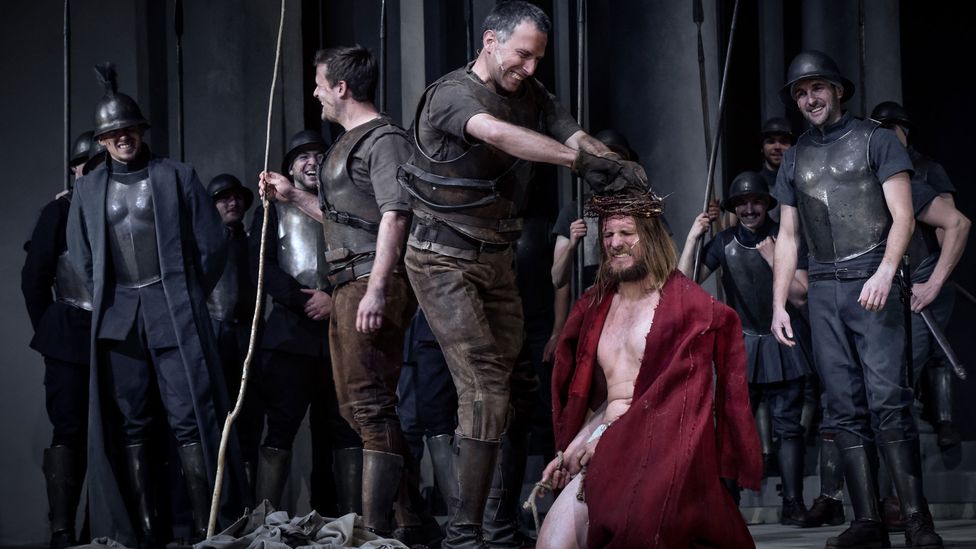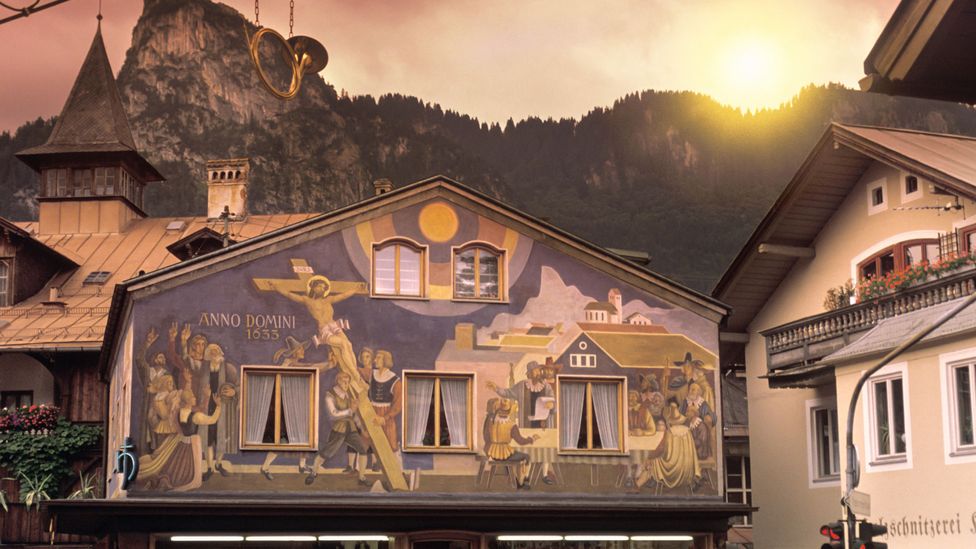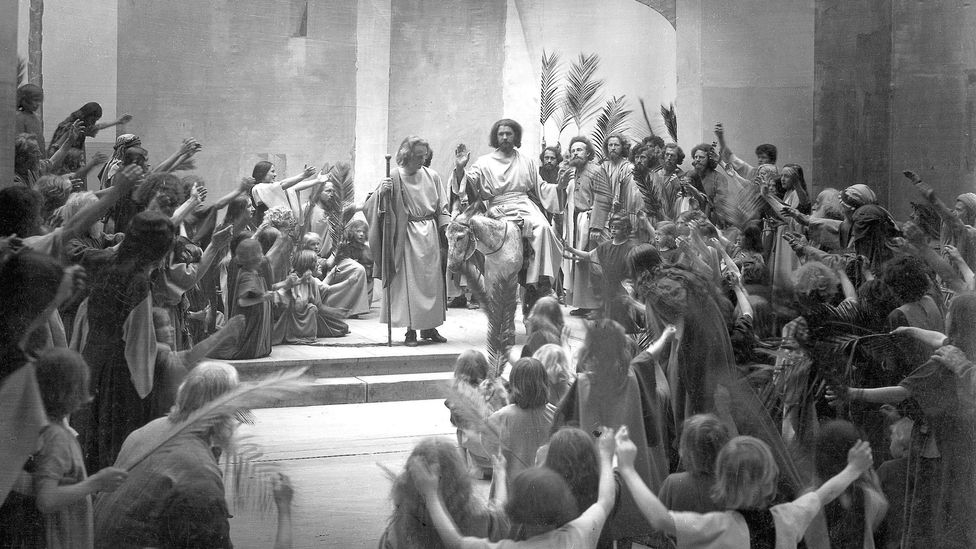The play still going after 388 years

Visiting Oberammergau, a small village located in Germany’s Bavarian Alps, feels like stepping into a Disney film. From the rolling mountains that frame the village, to the wooden houses covered with swirling folk art paintings and carvings – a practice that dates back to the 16th Century there – the words “quaint”, “cute” and “postcard-worthy” come easily. It doesn’t even seem outrageous that the area has its own wine and cheese vending machine… because why wouldn’t they encourage visitors to enjoy this setting as much as possible?
More like this:
– Shakespeare’s most controversial villain
– The mysterious ancient civilization for now
– A symbol that spread around the world
Located near the centre of the village is St Peter und Paul, a baroque Catholic church. It was here, in 1634, in the Rococo-style church, that the villagers first made a historic pledge. In a turn of events that feel eerily resonant now, the black plague had come to the village and decimated almost 20% of the population in only a few months. In an attempt to turn the tide, the residents promised that they would perform a passion play – aka a dramatic retelling of the life, death, and resurrection of Jesus Christ – once every 10 years, if God spared the rest of the city. The first productions were performed in the church graveyard, just above the bodies of those taken by the disease, and – as the story goes – no one else died.

The latest staging of the Oberammergau Passion Play is running from May to October this year, having been delayed by two years because of the pandemic (Credit: Arno Declair)
Since those first performances, plenty of events have conspired to stop the plays, which are typically performed at the beginning of every decade, including the Franco-Prussian War, the Spanish Flu – and yes, Covid-19, with the 2020 production postponed until this year, when it is running as usual from May to October. Historically, it’s experienced mixed support: in 1770 the Duke of Bavaria Maximilian III Joseph tried to ban it, claiming “the theatre stage is no place for the greatest secret of our holy religion”. However, in 1900, entrepreneur Thomas Cook found such a value in the performance, he compelled the city to build a 4,400-seat theatre so that he could sell foreign audiences on the idea of seeing a five-hour play (with an additional three-hour dinner break) in a language they didn’t speak, a move that effectively introduced tourism to the region.
A group effort
Now in its 388th year, the passion play influences nearly aspect of the life in the village. Nearly 2,000 of the Oberammergau’s 5,000 residents take part both in front and behind the stage. Main actors commit to taking almost a year off work for rehearsals, a group trip to Israel, and the six-month play performance schedule. And every man commits to growing out his hair for the year leading up to the show, and keeps his shaggy do until it’s cut during the wrap party. (Their hair is later displayed in ropes in the Oberammergau Museum, a building covered in blue denim costumes from 2000 and 2010 Passion Plays.)
As Frederik Mayet, one of the two actors alternating in the role of Jesus this year, says, all group sacrifices are in service of what they see as the greater good. They’ve been literally training for this their entire lives.
“The small ones grow into the into the passion play,” he says. “The youngest ones are just a few months old on stage the first time. The first song in the passion play, when Jesus is ridding the donkey, that’s a song that everyone learns in school. We sang it for the first time a few weeks ago [in rehearsals]. I had goosebumps. It’s very emotional right now.”
The entire cast of the passionspiel are amateurs. However, the production’s 12 scenes feel well-polished. A barnyard’s worth of animals crop up on stage, including the donkey that assists Jesus’s first appearance. And every New Testament beat, including Jesus purging the temple, performing miracles, sitting for the last supper, and ultimately dying and rising again, plays out with a heart-breaking honesty. Between acts, Old Testament-inspired static tableaus, depicting scenes that are supposed to specifically prefigure events playing out in the main story, add a touch of surrealism. During large crowd scenes, younger actors fidget with their costumes and wiggle around stage, adding a touch of realism. (One must assume Biblical-era children didn’t always recognize the gravity of what they were witnessing). But none of this distracts from the play’s central theme. The play might be in German (with available manuscripts in English), but even if you don’t speak the language the mission is clear: this is an act of passion.

Oberammergau is the most picturesque of Bavarian villages, and the passion play is at the heart of everything it does (Credit: Alamy)
Christian Stückl, the artistic director of Munich’s People Theatre, who took charge of the passion play in 1990, and has directed it for the fourth time this year, says creating it is a very unique theatrical experience in some ways – but then ultimately, a show is a show.
“I like it very much to act with these amateurs here in Oberammergau,” he says. “It’s quite different if I work with professional actors in Munich. In Oberammergau, I have to go on stage and show you how to do it. Professional actors don’t like if I go on stage and show them. But an amateur, he needs it. [But] in the end, it’s not so different, because you can have bad professionals and good amateurs. It’s very close together.”
In his time at the helm, Stückl has also seen the play go through a number of notable administrative changes. In 1999 he successfully petitioned to remove the rule that all actors must be Catholic. (Although he calls the still-standing rule that you must have been born in the village or be a 20-year resident too restrictive, noting that two decades is too long to prove that you’re a part of the city.) However, making adjustments to the actual production can be tricky when you’re dealing with centuries of tradition.
“We have a lot of trouble with Oberammergau because the younger generation likes to have a new play and the old generation holds on [to] the older passion plays,” says Stückl. “Most tourist operators are like, ‘no you have to do the same, like 10 years back, because my audience like to see the same play’.”
Moving with the times
However, despite pushbacks, evolution has occurred. VIP guests throughout the years include Hitler, who unfortunately was a big fan. Because of that, Stückl felt it was important to ensure any potentially antisemitic readings of the material were squashed. With this in mind, the changes made include the addition of a menorah that now is placed on the table during the last supper, while at one point, Jesus holds up the Torah to the audience – all to emphasise that Jesus was Jewish.
Mayet hopes his depiction of Jesus is fitting for the times too. Much like when the play started, the world is in turmoil. If Passion Play’s Jesus needs to shout in order to be heard, then so be it.
“We want to have a Jesus who is very confident in what he’s saying,” he says. “So someone that is very loud and shouting. A lot has changed in the last 12 years. We have a totally different world situation. The rich get richer and the poor get poorer. And we’ve had Covid in the last two years. In 2015 and then again this year we had the refugee crisis in Europe. So, there’s a deep need for Jesus to be louder again.”
It’s understandable that this play, a once a decade rarity, has become a pilgrimage for both believers and those who simply appreciate an epic show. As audience members, we love seeing passion, but perhaps even more, we’re drawn to stories of families. And while it’s easy to visually trace physical genealogical similarities among the actors, the Oberammergau passion play is also the story of “chosen family” – of a group of people who share in deep love and support for each other despite not being biologically related. As local resident and performer Otto Huber (who laughs and says, “they tell me I’m 75” when asked his age), explains, it is that factor that has kept him participating year after year – something he’ll continue as long as he’s able.

The play covers all the major beats in the story of Jesus including, in this scene from the 1934 300th anniversary production, his entry into Jerusalem (Credit: Alamy)
“Oberammergau is an amazing place,” he says. “It’s so fantastic to look at Oberammergau with this variety in the evolution of art, of music, and of theatre. That’s really wonderful. And we were thankful that we can live at this place. And the base of everything is a warm brotherhood. We have a very good family feeling for our neighbours. The ancestors of my mother came to the city before 1600. And while we haven’t got the casting lists [from back then], we were always very much dedicated to the play.”
If you would like to comment on this story or anything else you have seen on BBC Culture, head over to our Facebook page or message us on Twitter.
And if you liked this story, sign up for the weekly bbc.com features newsletter, called The Essential List. A handpicked selection of stories from BBC Future, Culture, Worklife and Travel, delivered to your inbox every Friday.








